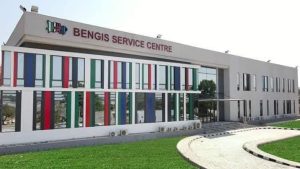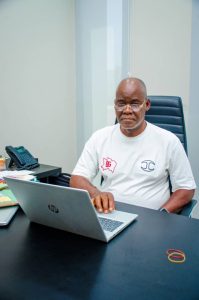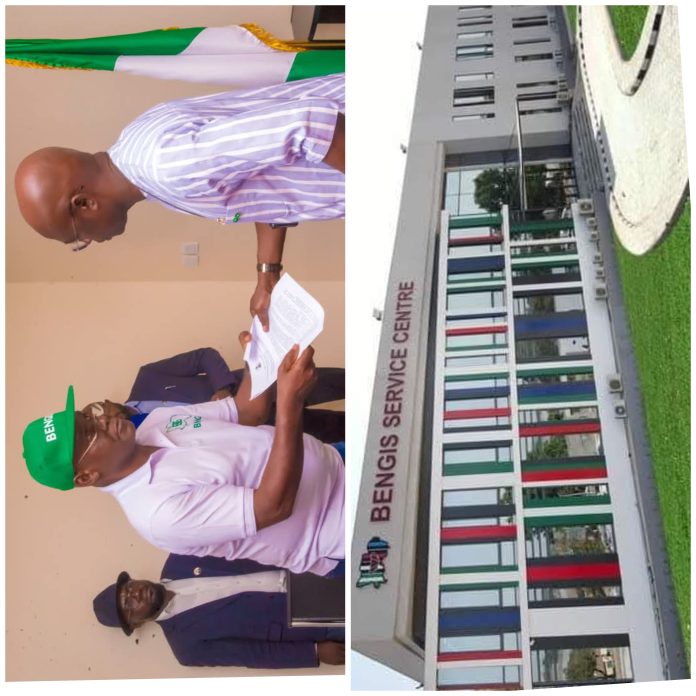
Bridget Tikyaa
When Governor Hyacinth Alia approved the creation of Benue Geographic Information Services and signed the Executive Order for its take off, its mandate was clearly spelt out. Digitise land administration, support infrastructure development, and contribute to making Benue State safe.
According to Mr Terna Kawen, Director Capacity Building and Stake Holders Engagement at BENGIS, this simply means to fast track the processes leading to the award of land statutory titles, online processing of applications, payment, land records, and keeping the process transparent based on existing laws.
“The Agency is also positioned to provide geospartial data for both the private and public sectors to support Urban and Regional Planning and Management by providing population indicies maps. Land use and classification plans, flood risk maps, geological formation maps, crime incidence maps, hydrology maps, drainage system plans, etc.
“It will also provide data on infrastructures like road network plans, transportation network maps, Hospitals, Schools, Markets Security posts, Power distribution network plans and data on many other variables that are useful in Urban and regional planning and management. The list is endless,” Tema said.
No doubt the task before BENGIS is enormous, but so also the determination of the Director-General, Professor Daniel Amine, who has hit the ground running, setting up the relevant team and infrastructure to drive the vision of setting up this all inclusive agency which will support all aspects of governance, from security to infrastructure, town planning and tourism, to maintaining balance in the ecosystem.
To Professor Amine, all these are achievable as his team has since hit the ground running. His first target is to ensure that the processing of land application and issuance of statutory land documents are done within 30 days as directed by Governor Alia.

“The premium time he wants is 30 days. If you apply for CofO, there isn’t any reason why you won’t be able to get it in 30 days. We have resumed and pursuing this course. Our portal is already up, and we are fine tuning and doing some testing to ensure that it is running seamlessly with the software we are using to process titles.” That assurance is golden, something to take to the bank.
There is, however, a huge expectation on the citizens. Those who own land but refused to pay government its dues. “If you have CofO and you have not been paying ground rent, we are not going to forgive you. You will be charged from your last payment till today,” the Director-General said.
However, in pursuing this payment, the government has taken into cognisance the current economic realities and decided to waive 50 per cent of the accumulated ground rent.
“The good aspect of this is, the government of Rev. Fr Dr Hyacinth Alia has granted a tax relief. If you come now, you will get 50% reduction. He may decide to suspend the relief, so the earlier you come, the better,” he said.
To get the buy in of the people, Amine said the organisation, which has been granted independent status by the governor, will embark on massive awareness campaign on its services so as to get the people of the state to follow proper and secure channels of obtaining land and other information.
“We are going to come for your community meetings, neighbourhood, schools, and markets to talk to the people. Please take advantage of the relief the governor had granted and come to our office so that you enjoy the grant that has been provided.
“In a short while, we are going to come to your street and your neighbourhood, demanding for your ground rent and asking that you update your certificate of occupancy.
“If you have the old one from local government and you take it to the bank, the bank will not accept it. The bank will only accept the CofO that BENGIS issues, we are going to give you a new CofO, which will be accepted by banks.
“So, if you have the old one that is not digitized, please come to our office, we will collect it and give you another one. If you have a local government CofO, please bring it. we will upgrade it to the new standard CofO. It is not free, it is for a fee.”
As already enumerated, the primary goal of BENGIS is to locate and secure people’s assets, which include property, information, data, solid mineral deposit, security information, etc.
“When we locate these informations, assets, property, we provide the information for end users. It is the belief of Rev. Fr Dr Hyacinth Alia that we should use cutting age technology, especially in the processing of land titles for the teaming populace of Benue.
“You remember that before now, someone will begin to process his Certificate of Occupancy (CofO), and for 15-20 years, it is not ready. Fr Alia does not want that to continue. At the point of my appointment, he instructed me specifically to ensure that this process is simplified by making it an online process such that people can apply from the comfort of their homes, through their phones, computers or cyber cafes. People can apply for lands and titles and be able to track the process and know what stage it has moved from.”
To key into the BENGIS initiative, residents should download the agency’s app from the Google Play Store. “In another week, we assure that from anywhere around the world, you can go to Google Play Store and download our app and apply for whatever facility you want.”
Amine explained that BENGIS would also be providing critical information on the state of infrastructural facilities, security, and other areas of importance to the state.
” While the titles are for individuals, we can provide information to government on where to locate schools, which roads is most critical and should be constructed next, because we know where the people live and the volume of traffic that flows downs the road everyday. It is therefore possible for us to advise the government on the next road to construct and which has more impact on the lives of the average Benue citizen.
“We can help locate your farm produce in the market, the best price. It is possible for us to produce maps and charts that will give information about where to get your products cheaper and a lot more.”
BENGIS seems to be like a jack of all trades and master of all. It is also involved in house numbering, a key security feature that also has economic advantages.
“When you number your house and Geo-tag it, it is possible to use goggle map to trace that house if a visitor visits. It is possible for the visitor to type the house number on his phone and goggle it to show the road to the house, adding that this would curb insecurity in the state.
“The type of house numbering we are going to do will be such that every house in our cities will be geo-tagged. We want to take it to the extent where if there is a yard and it has four houses or rooms, we geo-tag each, so as to locate a person easily through the phone with the help of goggle.”
In leading BENGIS, Amine says he is aware of the challenges and has already taken strategic steps to give it an upper cut.
For an agency like BENGIS to function seamlessly, it must have a non-stop electricity supply. Unfortunately, this is completely absent at the massive complex.
“The biggest challenge I have found at BENGIS is power. The facility was not connected to public power supply after it was built, so in the past 90 days, we have had to run on generators, and if you have bought a liter of diesel recently, you know that it’s not production-friendly.
“I know that the great access and privileges His Excellency is giving to me now, I trust it will be a thing of the past shortly. Thankfully, this facility has a short roof, thus making it suitable for solar panels to be installed on top of the building. If we do that, it will help us run the entire building on solar.
“I also have very strong plans to have it connected to the public power supply because the whole industry is computer based, and power is needed to make meaningful progress.
“All the data that we process is stored in a system called saver. It is supposed to be on 24/7. When your activities are done for the day, the saver starts to update its memory, the update may last overnight, and when you return the next day, you begin to use again. If however the saver is switched off at night, the saver will now be trying to update what you did the day before and cope with what you’re doing on a new day, which will make it slow. The correction is simple, getting solar panels for the building to run the saver overnight to avoid excess workload the next day.
He explained why the saver needs to be updated at all times. “This is so that when I need a particular information, it will be able to connect and give an update information about that location. If a person in New York purchase a land, they need my saver to access the information. If there is no electricity it will be delayed. The facility is supposed to run at all times. The saver will not stop updating and receiving information.
“In our towns, for every satellite pole, there is a generator that is not put off. That is the kind of system we need here. This is the kind of powering system that is needed in our facility for the smooth running of this programme. A day will come in BENGiS when our generators go to backup degree two, and our light will go to back up degree one.”
Bridget Tikyaa
Is the Principal Special Assistant to the Governor on Media, Publicity and Communications Strategy

